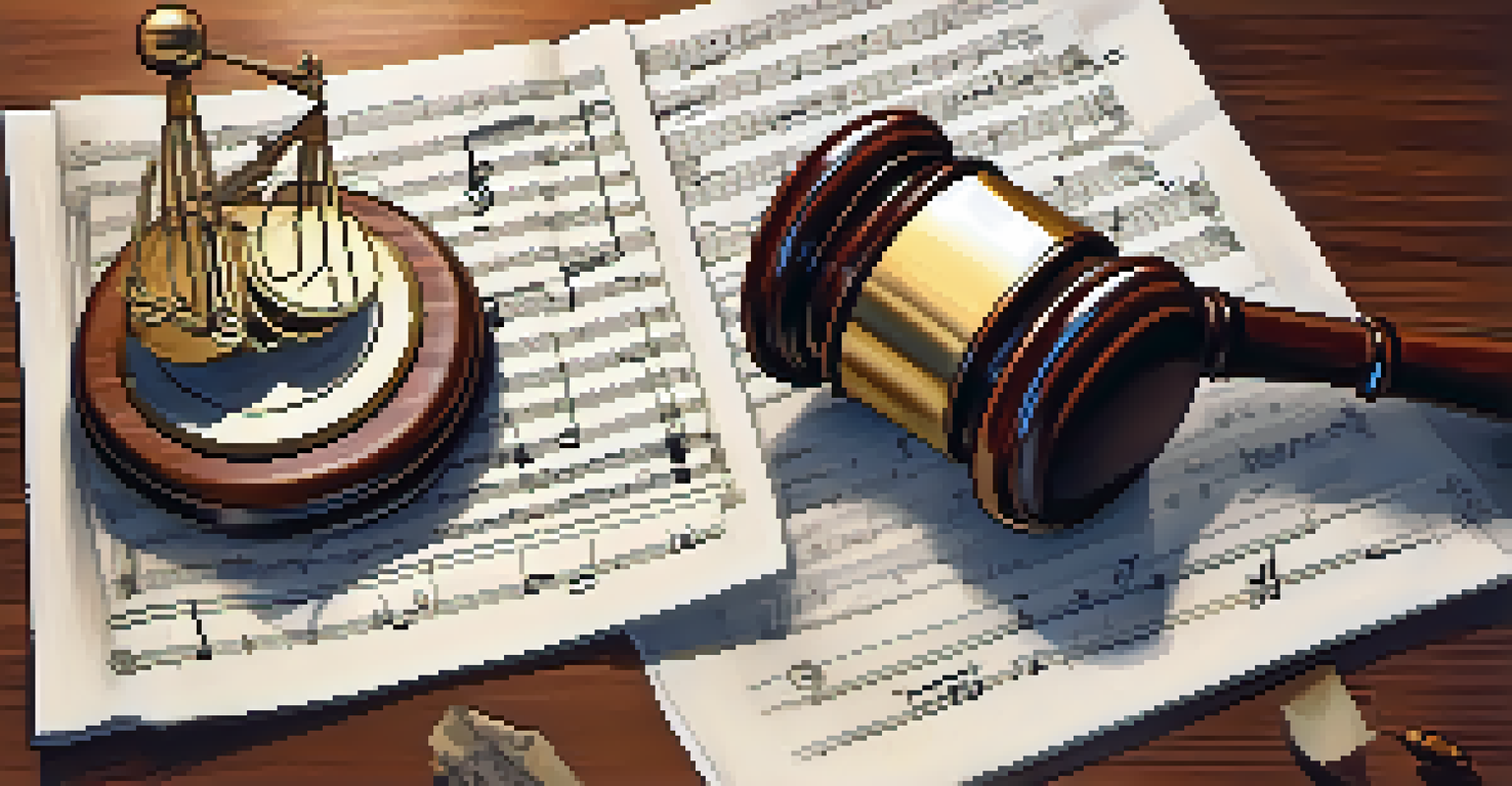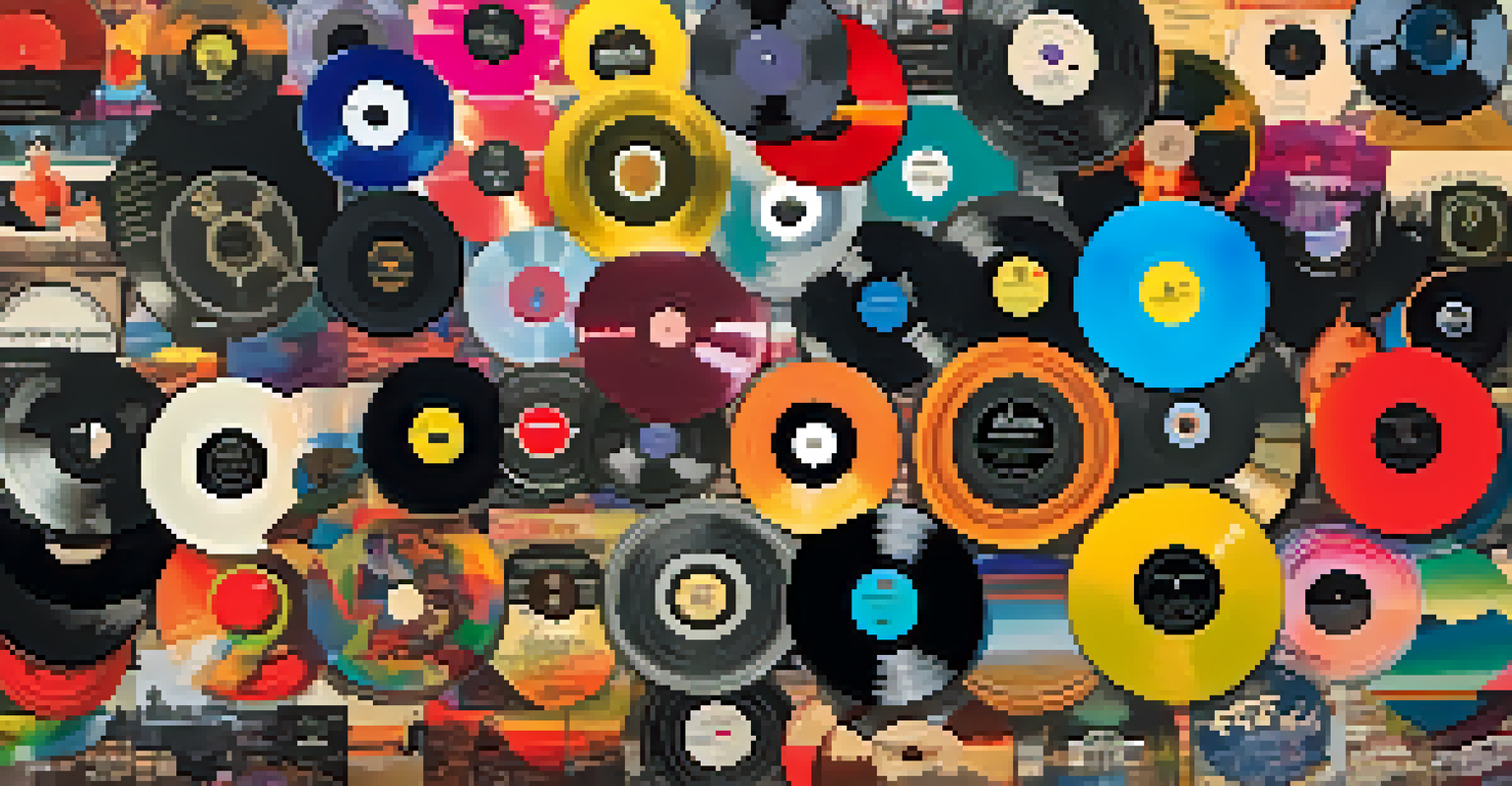Music Licensing for Podcasts: What You Need to Know

Understanding Music Licensing Basics for Podcasts
Music licensing is crucial for podcasters who want to use music legally. It refers to the permissions you need to obtain to use someone else's music in your podcast. This might sound complex, but understanding the basics can help you avoid legal troubles down the line.
It's a shame to be 'famous' for the wrong reasons, like copyright infringement. Always respect the music you use.
There are different types of licenses, including synchronization licenses and master use licenses, which can be a bit overwhelming. Simply put, a synchronization license allows you to pair music with visuals, while a master use license is about using the actual recording. Knowing the right license for your needs is the first step to staying compliant.
By grasping these concepts, you're setting a solid foundation for your podcast. It’s not just about choosing your favorite tunes; it’s about ensuring that you respect the rights of the artists who create them.
Why Music Licensing Matters for Podcasters
Not securing the proper licenses can lead to serious repercussions, including hefty fines and even having your podcast taken down. Imagine pouring your heart into an episode only to have it removed because of a music copyright violation—that’s a nightmare scenario for any creator.

Moreover, respecting music rights fosters a better relationship with artists and the industry. It shows that you value their work, which can lead to potential collaborations in the future. After all, the podcasting community thrives on creativity and mutual respect.
Importance of Music Licensing
Securing the right licenses protects your podcast from legal issues and shows respect for artists' rights.
In essence, music licensing isn't just a legal hurdle; it's a way to honor the creativity that fuels your podcast. By ensuring you have the right licenses, you can focus on what you love—creating engaging content.
Types of Music You Can Use in Your Podcast
There are several types of music you can incorporate into your podcast, and each comes with its licensing requirements. For example, you can use royalty-free music, which is often available for a one-time fee or even for free, depending on the source. This is a popular choice for many podcasters looking to save on costs.
Music can change the world because it can change people.
Alternatively, you might consider using original music composed specifically for your podcast. This can give your show a unique identity and avoid licensing headaches altogether. However, commissioning original music usually comes with a higher price tag, so it's essential to weigh your options carefully.
Finally, there's the option of using popular commercial music, but this often requires navigating complex licensing agreements. While it might be tempting to add that catchy tune everyone knows, the associated costs and legalities can be significant.
How to Obtain Music Licenses for Your Podcast
Obtaining music licenses can seem daunting, but breaking it down into steps can simplify the process. First, identify the music you want to use and determine the type of license you need. This initial research will save you time and effort later on.
Next, reach out to the rights holders or licensing agencies. Many artists and labels have clear guidelines on how to obtain licenses for their music. Don’t hesitate to communicate your podcast's purpose; many artists appreciate the exposure and may offer you a reasonable deal.
Types of Usable Music
Podcasters can choose from royalty-free tracks, original compositions, or popular commercial music, each with different licensing requirements.
Lastly, always keep documentation of your licenses. This not only protects you legally but also gives you peace of mind as you create content. Think of it as your safety net in the often tumultuous world of podcasting.
Common Misconceptions About Music Licensing
One common misconception is that using music in a podcast is free as long as you give credit to the artist. Unfortunately, this isn't true; credit does not equate to permission. Just because you acknowledge the artist doesn't mean you're legally allowed to use their work.
Another myth is that all music labeled as 'royalty-free' is free to use without restrictions. While some tracks are indeed free, others may require payment or have specific conditions attached. Always read the licensing terms carefully to avoid any surprises.
Lastly, many believe that small podcasts are unlikely to face copyright issues. However, the size of your audience doesn’t diminish the necessity for licenses. Even small shows can attract attention, making it essential to adhere to licensing laws from the start.
Resources for Finding Licensed Music for Podcasts
Luckily, there are numerous resources available to help you find licensed music for your podcast. Websites like Epidemic Sound and AudioJungle offer extensive libraries of tracks that you can use with the appropriate licenses. These platforms often provide clear guidelines on usage, making it easier for creators.
Additionally, platforms like SoundCloud and Bandcamp can be great resources for discovering emerging artists who may be open to collaboration. Many artists on these platforms are eager to share their music, especially if it means gaining exposure through your podcast.
Resources for Licensed Music
Platforms like Epidemic Sound and local artists offer accessible options for finding licensed music for your podcast.
Finally, don’t forget about local musicians! Reaching out to artists in your community can yield unique and original sounds while supporting local talent. Not only will this enrich your podcast, but it can also lead to exciting partnerships.
Best Practices for Using Music in Your Podcast
To ensure a smooth music licensing experience, start by planning your music usage in advance. Knowing what tracks you want to include in each episode can help you gather the necessary licenses early on. This proactive approach can save you from last-minute scrambles.
Keep your audience in mind when choosing music. The right track can enhance your storytelling and create a more engaging listening experience. Think of music as an emotional cue—select tracks that align with the tone and theme of your podcast.

Lastly, always stay informed about changes in music licensing laws and trends. The landscape is continuously evolving, and being aware of these changes can keep your podcast compliant and relevant. Regularly revisiting your music strategy will ensure your show remains fresh and enjoyable.